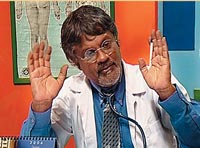
Family Doctor to cure tele diseases "Neighbour Talks" and "Family Doctor" were two programmes that were able break the monotony at least for a few minutes for the week. Difference may be due to the differences of the persons by whom they were written and presented. Journalist, writer and banker by profession Sarathchandra Pathdanduwana is the man behind these much loved programmes. Though they make you laugh Pathdanduwana is not a joker or comedian. Speaking to TV Times Pathdanduwana shared some of his ideas about the media, its role and other details of how he originated his programmes. TVT: How did your entrance to the media took place? Pathdanduwana: It was in 1972. I joined 'Dawasa' newspaper in which I had a regular column. This was a satirical column where I could write on any subject that makes people laugh. After three decades I still continue this. TVT: What importance satire had in the media then? Pathdanduwana: The time was different then. We had to undergo a lot of restrictions and had to find alternative ways to express ourselves. Just imagine a government sealing a newspaper. So in this backdrop the only way to pass our messages to the masses was through satire and humour. It was important to criticise politics and politicians and at the same time we had to protect ourselves. TVT: Are you saying that the media and media men are different now? Pathdanduwana: With the pressure on us we were better disciplined now than then. In writing we maintained self censorship and there were areas we did not touch. But unfortunately today media uses cheap means and ways to attract its audience. TVT: What do you think is the reason for this? Pathdanduwana: Lack of guidance. We had role models to follow and to guide us. But we don't come across people like that now. And at the same time media men and women are born over night. When their names appear on a newspaper or their face on TV they think very highly of themselves. They do not understand the real value and how much a journalist should study. TVT: How was your entrance to television? Pathdanduwana: I did few documentaries related to economic issues and banking. But the programme that I that go to the public was 'Neighbour Talks', started at the invitation of Jackson Anthony who is attached to Swarnavahini channel. I presented it with Wasantha Moragoda who played the character of 'Lamaya' or child. The programme was a real success. TVT: Any unforgettable memories with 'Neighbour Uncle'? Pathdanduwana: This was not a very pleasant experience though I will never forget it. Once, a few minutes before the live programme was over, my colleague Moragoda accidentally called a politician a 'Buruwa' or ass. But we managed to correct through our dialogues. But the late H. D. Premaratne who was a director in the company then was watching the live programme and he was infuriated over this mistake. He contacted Moragoda who was presenting the programme on his hidden mike and began to upbraid him. I felt something was going on and saw Moragoda looking upset. This was recorded in the camera. With the greatest difficulty I managed to complete the programme but as soon as the programme was over I went to Premaratne and gave him a severe dressing down.. TVT: What about the 'Family Doctor'? Pathdanduwana: The main concept for this programme is that each and everyone of us undergo some sort of a disease. And we try to analyse them humorously while criticising some the unacceptable practices of the health sector today. For this I get very good response not only from the general public but also from a large number of doctors and others in the health and medicine field. They sometimes even request to change the programme time so they would not miss it. TVT: Don't we have anything else other than politics for satire and humour? Pathdanduwana: There is nothing without politics today. From breakfast until dinner and from birth until death we are some how connected to politics in one way or another. And politics makes timely humour. And at the same time a safe way to criticise politics is through humour and satire. |
|| Front
Page | News | Editorial | Columns | Sports | Plus | Financial
Times | International | Mirror | TV
Times | Funday
Times || |
| |
Reproduction of articles permitted when used without any alterations to contents and the source. |
© Copyright
2007 Wijeya
Newspapers Ltd.Colombo. Sri Lanka. All Rights Reserved. |
 Variety is the need of the hour for our television today. Teledramas, on the subjects of most common issues like family problems or the most recurring subject of love stories, political discussions arranged according to the agendas of different channels and musical competitions conducted by almost all the channels cover the most of the television air time.
Variety is the need of the hour for our television today. Teledramas, on the subjects of most common issues like family problems or the most recurring subject of love stories, political discussions arranged according to the agendas of different channels and musical competitions conducted by almost all the channels cover the most of the television air time.